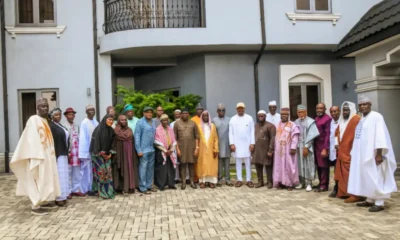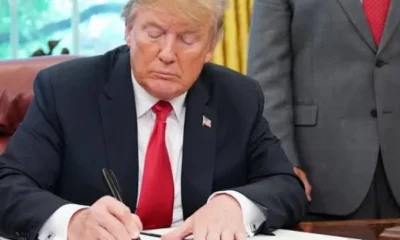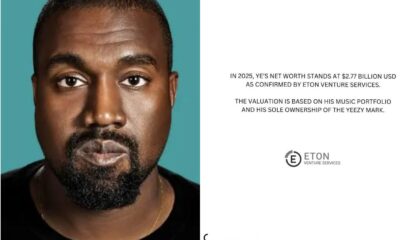Tech
Naira Collapse: Tinubu’s Aide Tells Central Bank, EFCC to Ban Crypto Exchange Platforms In Nigeria
Onanuga, gave the advice in a statement he shared on his X (formerly Twitter) handle on Wednesday. He also suggested that Crypto channels should be banned in the country, otherwise, “this bleeding of our currency will continue unabated”.
The Special Adviser on Information & Strategy to President Bola Tinubu, Mr Bayo Onanuga has called on the Economic and Financial Crimes Commission (EFCC) and the Central Bank of Nigeria (CBN) to move against platforms trying to manipulate the naira through crypto exchange platforms.
Onanuga, gave the advice in a statement he shared on his X (formerly Twitter) handle on Wednesday. He also suggested that Crypto channels should be banned in the country, otherwise, “this bleeding of our currency will continue unabated”.
Titled: “The Naira-Dollar manipulators,” the presidential aide explained how he chanced upon an X post Tuesday night made by one Brother Bernard, who according to him, rallied against what he called the order of the EFCC, NSA (National Security Adviser) on Finance to set a cap on traders selling USD tokens for naira equivalent.
According to the presidential aide, the said Bernard disclosed that token sellers had migrated to Telegram and were selling naira at N1850 and above.
Onanuga said, “He did not stop there, he lashed out at the Nigerian authorities over the efforts to arrest the slide of the Naira. He wrote: ‘If this is how they plan to save the naira, I’m sorry but it’s going to fail woefully. Binance was only a medium. If you block Binance, people will find new ways. This whole policy is absolutely ridiculous. Naira is going to zero’.
“Naira going to Zero? Is the owner of this account a Nigerian patriot? I checked Bernard’s profile. He says he is “BUIDLing something for migrants” and he is the “Chief Commander of Japa”. Bernard also posted a web link www. http://exposingagbado.com.
“My curiosity has paid off. Bernard is one of those implacable supporters of President Bola Ahmed Tinubu’s opponents in the last election, still having an axe to grind; otherwise, why will any patriotic Nigerian wish that “Naira is going to Zero”.
“On Tuesday, Bernard shared Naira-Dollar rates on some unidentified platforms, possibly Telegram, where Naira is being traded at N1900-N1950 to a US dollar.
“He also enjoined forex traders or token holders to move their funds to ‘kucoin or bybit or your own cold wallet.’”
Onanuga regretted that Bernard reported on Wednesday that Binance had removed Tuesday’s cap and had now put another cap on the naira-dollar exchange. It is now N1892, he said, with a trading range of N1392 and N1892.
The presidential aide said, “He was not happy about the new cap and attacked Binance: ‘Binance continues their games with Nigerians. Caps at 1892 when clearly the exchange rate is almost 2000/$ on other platforms. Trade elsewhere (NFA)’.
“He retweeted a post by ‘Olumide capital’, who said Binance ‘distances itself from the forex debacle in Nigeria. Olumide reported that Binance said its platform is “market-driven and not intended to be a proxy for currency pricing in Nigeria.’”
Calling on the authorities to go after currency manipulators, the presidential aide explained that Binance, “which is blatantly setting exchange rate for Nigeria, hijacking CBN role, is a cryptocurrency trading platform, which has suffered access limitations from multiple jurisdictions, in the US, Singapore, Canada and the UK”.
Citing Data Wallet, Onanuga said that Binance is prohibited in the United Kingdom by the Financial Conduct Authority from conducting any regulated activities.
He continued, “In Japan, the Financial Services Agency (FSA) banned Binance for operating without the necessary regulatory approval.
“Ontario, Canada, has also suspended Binance services following its inability to meet the province’s securities regulation criteria. The Monetary Authority of Singapore also banned Singaporean investors from accessing Binance’s services.”
He added Binance, “which is currently facing regulatory showdown in many countries, and causing disruptions in the currency market, should not be allowed to dictate the value of the Naira, not on its crypto exchange platform.
“Other crypto platforms such as Kucoin, Bybit should be banned from operating in our cyberspace.”
“FX platform Aboki should be re-banned,” he suggested. He advised that the “EFCC and the CBN should move against these platforms trying to manipulate our national currency to Ground Zero”.
“Crypto should be banned in our country or else this bleeding of our currency will continue unabated,” he added.
Tech
“I Lost $1.2 Million To Hackers On One Of My Apps. I Caught One Of The Hackers, And Instead Of Handing Him Over To The Police, I Employed Him To Work For Me.”- BLord

Anambra Born tech entrepreneur and businessman Linus Williams, popularly known as BLord, has shared an unusual story about how he handled a major cyberattack on one of his applications.
According to BLord, he lost $1.2 million to hackers who infiltrated one of his digital platforms. In the course of tracking the incident, he successfully identified one of the individuals involved in the breach.
Rather than handing the suspect over to security agencies, BLord said he made a strategic decision: he employed the hacker.
He explained that the hacker’s skills, though misapplied, were exceptional and could be redirected towards strengthening his company’s cybersecurity systems.
BLord noted that the decision was driven by a desire to turn a negative experience into an opportunity for growth and to better secure his business infrastructure.
Tech
MAN Honours Zobis Cable CEO, Ezeobi, at 37th AGM

The MD/CEO of John Zobis Group, Mr. John Ezeobi, has again been honoured with another major industry prize in recognition of his contributions to local sourcing, innovation and the growth of Nigeria’s manufacturing capacity.
The prestigious award, “Pillar of Industrial Enterprise and National Impact,” which was conferred on him by the Manufacturers Association of Nigeria (MAN) — Anambra, Ebonyi and Enugu Zone, was presented during the association’s 37th Annual General Meeting, Awards & Gala Night at the International Conference Centre, Enugu.
coming barely three weeks after Ezeobi was nominated as the winner of The Sun’s Industrialist of the Year Award 2025 by the Management of The Sun Newspaper, a run of recognition that has further highlighted his rising profile in the South-East manufacturing ecosystem.
The latest award, it was gathered, celebrates Ezeobi’s deliberate investment in backward integration, his push for local sourcing of raw materials and efforts to strengthen domestic value chains, which MAN described as essential to reducing import dependence and creating jobs across the region.
Chaired by Chief Obinna Iyiegbu (Obi Cubana), the well-attended occasion, themed “Exploring Opportunities for Backward Integration and Local Sourcing of Raw Materials for the Manufacturing Sector,” brought together regulators, policymakers, manufacturers and industry stakeholders and also featured presentations, panel sessions and cultural performances, among other highlights.
Speaking at the event, the Keynote Speaker and Director-General of the Raw Materials Research and Development Council (RMRDC), Prof. Nnanyelugo Ike-Muonso, said the economic benefits of exploring Opportunities for backward integration and local sourcing of raw materials for the Manufacturing sector cannot be overemphasized.
Prof. Ike-Muonso told delegates that Nigeria spent over ₦3.53 trillion importing raw materials in the first half of 2025 alone, warning that such dependence continues to weaken the nation’s economy. He further argued that the proposed 30% Value Addition Bill, which would require a minimum local value addition before export, would be transformational if signed into law.
He also outlined the bill’s potential to expand GDP, generate hundreds of thousands of jobs and save foreign exchange by keeping more of the country’s raw-material wealth in domestic supply chains, boost local manufacturing, and generally reposition Nigeria as a regional industrial hub.
On his own part, the Governor of Enugu State, Dr. Peter Mbah, endorsed the call for stronger industry-academia partnerships and urged financial institutions to make affordable credit available to manufacturers who adopt backward integration. The governor, who was represented by his Deputy, Barrister Ifeanyi Ossai, described the policy pathway as key to moving Nigeria from resource export dependence toward higher-value industrial output.
Reacting via his social handle shortly after receiving the award, the Zobis Cable Boss expressed gratitude for the honour, describing it as a strong motivation to do more in driving local production, reducing import dependence, and strengthening Nigeria’s industrial base.
Ezeobi, who received the plaque from pioneer Nollywood star and legal practitioner, Barr. Kenneth Okonkwo, attested that the AGM provided a critical platform for renewed commitment to backward integration as a pathway to sustainable industrial development.
“The event highlighted the critical importance of backward integration and local sourcing of raw materials as strategic levers for strengthening domestic production, reducing import dependency, and building resilient, self-sustaining industries. A meaningful platform for driving progress and collaboration across Nigeria’s manufacturing sector,” he partly wrote.
Also speaking, the Chairman of MAN for the Anambra-Ebonyi-Enugu zone, Dr. Adaora Chukwudozie, described local sourcing as the pragmatic route to lowering production costs and stabilizing supply chains for SMEs and larger manufacturers alike. She welcomed RMRDC’s roadmap and invited state governments to partner in establishing raw-material corridors and shared processing facilities that would bring inputs closer to factories.
The event, which had His Eminence, Eze Eberechukwu Orji, Eze Aro, as the Royal Father of the Day, was also graced by other notable dignitaries and stakeholders, which include Senator Osita Izunaso, Dr. Gideon Chidiebere Osi, Ichie Sunday Ezeobiora , Chairman, Sunchi Farms; Mr Linus Williams Ifejika, Chairman Blord Group; Otumba Francis Meshioye, National President, Manufacturers Association of Nigeria; Dr. Ifeanyi Okoye, Chairman, Juhel Pharmacy; Chief Dr. Dan Chukwudozie, Chairman,Dozzy Group; Dr. Chike Obidigbo,Chairman, Hardis and Dromedas; Anambra Commissioner for Trade and Industry,Mr. Christian Udechukwu.














Tech
GLOBACOM SEALS STRATEGIC CONNECTIVITY PARTNERSHIP TO DRIVE IMO STATE’S DIGITAL TRANSFORMATION AGENDA

By Prince Uwalaka Chimaroke
15-NOV-2025
Globacom, one of Nigeria’s leading digital solutions providers, has entered into a groundbreaking Internet connectivity agreement with the Imo State Government through the Ministry of Digital Economy and e-Governance—an ambitious step that signals the state’s commitment to becoming a fully digitized economy and a model Smart City in the South-East.
The agreement, hailed as the largest single fixed Internet connectivity initiative ever undertaken by Globacom’s Enterprise Business Group, underscores the company’s growing influence in deploying world-class telecommunications infrastructure across Nigeria. This milestone partnership positions the operator at the heart of Imo State’s fast-evolving digital future.
Through the deal, Globacom will deliver high-capacity, state-of-the-art Internet infrastructure to strategic government and institutional locations. These include the 15-building Smart City complex in Owerri, the Ministry of Digital Economy and e-Governance, and the Imo State University for Innovation, Science and Technology (formerly Imo State Polytechnic). The infrastructure rollout is expected to strengthen digital literacy, modernize public administration, and enhance access to digital services for residents.
A central component of the project is the integration of the Glo-1 submarine cable—Globacom’s privately owned, trans-Atlantic fibre optic system that links Nigeria directly to Europe. Known for its high bandwidth, ultra-low latency, and secure connectivity, the Glo-1 network will serve as the backbone for Imo State’s digital expansion.
With this partnership, Imo State aims to accelerate e-governance, improve the efficiency of public service delivery, attract technology-driven investments, and promote innovation across sectors including education, commerce, and security.
The collaboration demonstrates a shared vision between the State Government and Globacom: to empower citizens, institutions, and businesses through robust digital infrastructure that can sustain long-term economic growth.
-
Business1 year ago
US court acquits Air Peace boss, slams Mayfield $4000 fine
-

 Trending1 year ago
Trending1 year agoNYA demands release of ‘abducted’ Imo chairman, preaches good governance
-

 Politics1 year ago
Politics1 year agoMexico’s new president causes concern just weeks before the US elections
-

 Politics1 year ago
Politics1 year agoPutin invites 20 world leaders
-

 Politics1 year ago
Politics1 year agoRussia bans imports of agro-products from Kazakhstan after refusal to join BRICS
-
Entertainment1 year ago
Bobrisky falls ill in police custody, rushed to hospital
-
Entertainment1 year ago
Bobrisky transferred from Immigration to FCID, spends night behind bars
-
Education1 year ago
GOVERNOR FUBARA APPOINTS COUNCIL MEMBERS FOR KEN SARO-WIWA POLYTECHNIC BORI
















